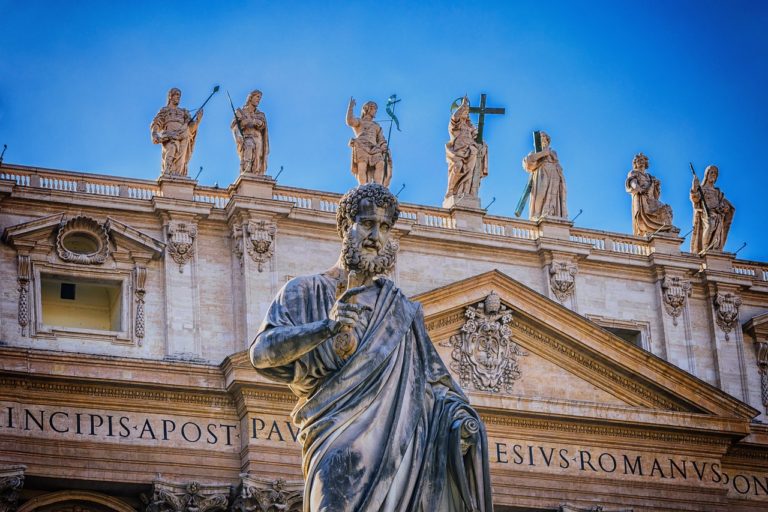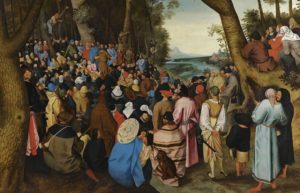
THE BIRTH OF JOHN THE BAPTIST
Luke 1:57-66
Christians have long interpreted the life of John the Baptist as a preparation for the coming of Jesus Christ, and the circumstances of his birth, as recorded in the New Testament, are miraculous. John’s pivotal place in the gospel is seen in the emphasis Luke gives to the announcement of his birth and the event itself, both set in prominent parallel to the same occurrences in the life of Jesus.
The birth of John the Baptist comes from the Gospel of Luke. John’s parents, Zechariah — a Jewish priest — and Elizabeth, were without children and both were beyond the age of child-bearing. During Zechariah’s rotation to serve in the Temple in Jerusalem, he was chosen by lot to offer incense at the Golden Altar in the Holy Place. The Archangel Gabriel appeared to him and announced that he and his wife would give birth to a child and that they should name him John, a name which was unfamiliar in Zechariah and Elizabeth’s families. However, because Zechariah did not believe the message of Gabriel, he was rendered speechless until the time of John’s birth. At that time, his relatives wanted to name the child after his father, and Zechariah wrote, “His name is John”, whereupon he recovered his ability to speak. Following Zechariah’s obedience to the command of God, he was given the gift of prophecy and foretold the future ministry of Jesus.
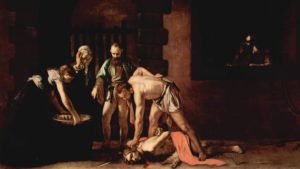
JOHN THE BAPTIST IS EXECUTED
Matthew 14:1-12, Mark 6:14-29
Herod, who was tetrarch, or sub-king, of Galilee under the Roman Empire, had imprisoned John the Baptist because he reproved Herod for divorcing his wife (Phasaelis, daughter of King Aretas of Nabataea) and unlawfully taking Herodias, the wife of his brother Herod Philip I. On Herod’s birthday, Herodias’ daughter (whom Josephus identifies as Salome) danced before the king and his guests. Her dancing pleased Herod so much that in his drunkenness he promised to give her anything she desired, up to half of his kingdom. When Salome asked her mother what she should request, she was told to ask for the head of John the Baptist on a platter. Although Herod was appalled by the request, he reluctantly agreed and had John executed in the prison
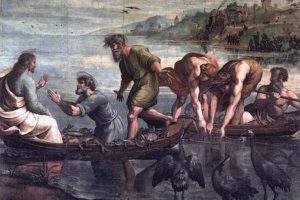
PETER RECEIVES THE KEYS OF THE KINGDOM
Matthew 16:13-20
The key of the kingdom is a Christian concept of eternal church authority. Christians believe it was established in the 1st century AD, initially through Saint Peter, then through the rest of the 12 Apostles. It is this authority, having been given the keys, that subsequent doctrinal points have been built upon.
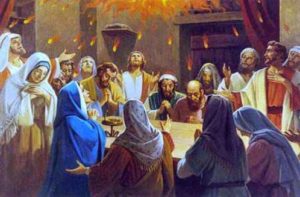
THE HOLY SPIRIT COMES ON PENTECOST
Acts 2
Pentecost was an important Jewish festival that marked the harvest. … The festival of Pentecost is still important to Christians today because it represents the beginning of the Christian Church. It reminds them how Jesus’ promise that God would send the Holy Spirit was fulfilled.
The apostles were celebrating this festival when the Holy Spirit descended on them. It sounded like a very strong wind, and it looked like tongues of fire. The apostles then found themselves speaking in foreign languages, inspired by the Holy Spirit.
The Holy Spirit came down upon the Apostles ten days after the Ascension of our Lord, and the day on which He came down upon the Apostles is called Pentecost.
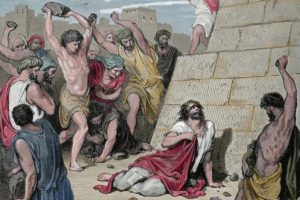
STEPHEN, THE FIRST MARTYR
Acts 6:5-15, Acts 7:54-60
Stephen was an intensely committed follower of Jesus, a Christian deacon in Jerusalem and the first Christian martyr, whose apology before the Sanhedrin points to a distinct strand of belief in early Christianity. The defense of his faith before the rabbinic court enraged his Jewish audience, and he was taken out of the city and stoned to death. His final words, a prayer of forgiveness for his attackers, echo those of Jesus on the cross. Stephen is the patron saint of deacons and stonemasons. His feast day is observed with both religious and secular traditions in a number of countries.
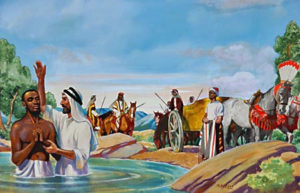
PHILIP BAPTIZES THE ETHIOPIAN OFFICIAL
Acts 8:26-39
Philip the Evangelist was told by an angel to go to the road from Jerusalem to Gaza, and there he encountered the Ethiopian eunuch, the treasurer of the Candace, Queen of the Ethiopians (Ancient Greek: Κανδάκη, the “Candace” was the Meroitic language term for “queen” or possibly “royal woman”). The eunuch had been to Jerusalem to worship and was returning home. Sitting in his chariot, he was reading the Book of Isaiah. Philip asked the Ethiopian, “Do you understand what you are reading?” He said he did not (“How can I understand unless I have a teacher to teach me?”), and asked Philip to explain the text to him. Philip told him the Gospel of Jesus, and the Ethiopian asked to be baptized. They went down into a water source, the Ethiopian says, “I believe that Jesus Christ is the Son of God” and Philip baptized him. After this, Philip was suddenly taken away by the Spirit of the Lord, and the eunuch “went on his way rejoicing”
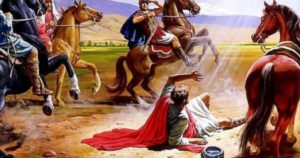
THE CONVERSION OF PAUL
Acts 9:1-31
Paul’s conversion experience is discussed in both the Pauline epistles and in the Acts of the Apostles. According to both sources, Paul was not a follower of Jesus and did not know him before his crucifixion. Paul’s conversion occurred after Jesus’s crucifixion. The accounts of Paul’s conversion experience describe it as miraculous, supernatural, or otherwise revelatory in nature.
The conversion of Paul, in spite of his attempts to completely eradicate Christianity, is seen as evidence of the power of Divine Grace, with “no fall so deep that grace cannot descend to it” and “no height so lofty that grace cannot lift the sinner to it. It also demonstrates “God’s power to use everything, even the hostile persecutor, to achieve the divine purpose.”
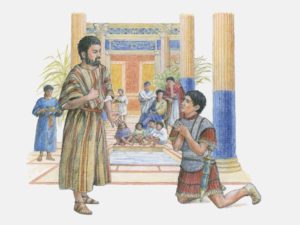
PETER AND CORNELIUS
Acts 10
Cornelius was stationed in Caesarea, the capital of Roman Iudaea province. He is depicted in the New Testament as a God-fearing man who always prayed and was full of good works and deeds of alms.
Cornelius prayed for the spiritual understanding to come to him, and God responded by sending the Apostle Peter to impart that spiritual knowledge to him. More revelation had been given since the Abrahamic Covenant, and Cornelius needed to be made aware of it.
As Peter entered the house, Cornelius met him and fell at his feet in reverence. But Peter made him get up. “Stand up,” he said, “I am only a man myself.”
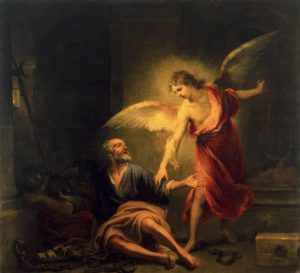
PETER IN PRISON
Acts 12:1-19
Peter was put into prison by King Herod, but the night before his trial an angel appeared to him and told him to leave. Peter’s chains fell off, and he followed the angel out of prison, thinking it was a vision.
When his escape is discovered, Herod orders the guards put to death.
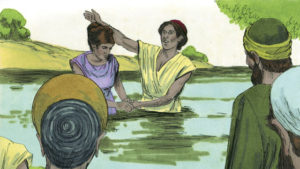
THE BAPTISM OF LYDIA
Acts 16:11-15
In Zygakti River, west of the ancient Philippi, the Apostle Paul baptized the first Greek-European Christian, Lydia of Philippisia. The first life lesson from Lydia is that we must have a heart open to the gospel. Only after your heart is opened to the gospel can your house be set in order. The text says Lydia and her household were baptized. After being baptized, Lydia begs Paul and his companions to come to her house and stay.
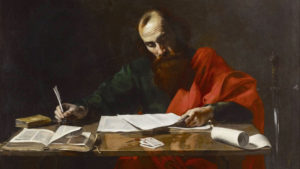
PAUL IN PRISON
Acts 16:16-40
In the prison at Philippi, Paul and Silas praised God and saw a great miracle. Because of their testimony in prison, several people were saved. Paul and Silas were ill-treated and imprisoned but they did not lose heart and continued to praise God.
Paul baptized a man in the middle of the night in that it had something to do with his eternal salvation. The process of the Philippian jailer’s conversion culminated with his baptism in water—bringing his faith to a completed result.
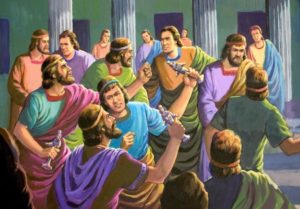
THE RIOT OF EPHESUS
Acts 19:23-41
Paul casting out demons and converting many pagan sorcerers who burnt their expensive magic texts.
The Artemis craftsmen were losing all their business because no one was worshiping Artemis anymore. The leader of the silversmiths guild, Demetrius, stirred up a riot and they drug some of Paul’s companions into the theater to work them over. The crowd was going wild, with some shouting one thing and some another.
Ephesus was an ancient port city whose well-preserved ruins are in modern-day Turkey.
Christianity was introduced already in the city of Ephesus in the 1st century AD by Paul the Apostle. The local Christian community comprised one of the seven churches of Asia mentioned in the Book of Revelation, written by John the Apostle.
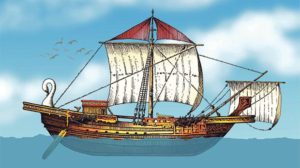
PAUL’S VOYAGE TO ROME
Acts 27, Acts 28
Apostle Paul’s Fourth Missionary Journey because the Lord God had sent him to Rome. The Lord saved him for this purpose. He was to bring the good news of Jesus Christ to Gentiles, kings, and the Jews
In 60 A.D., Paul began his voyage to Rome. On the way, the ship ran into a storm and was shipwrecked on the island of Malta, which lies in the Mediterranean about sixty miles south of Sicily.
Paul’s death is unknown, but tradition holds that he was beheaded in Rome and thus died as a martyr for his faith. His death was perhaps part of the executions of Christians ordered by the Roman emperor Nero following the great fire in the city in 64 CE.
